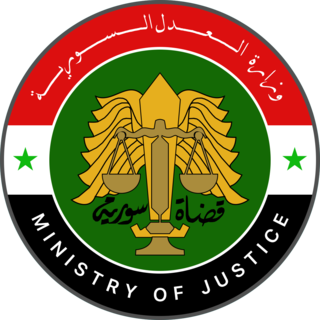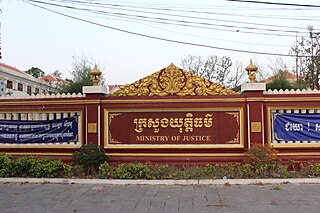
The Ministry of Justice is a government ministry office of the Syrian Arab Republic, responsible for judicial affairs in Syria.

The Ministry of Justice is an Algerian government ministry. Its headquarters is in El-Biar, Algiers.

The Ministry of Law, Justice and Parliamentary Affairs is a governmental body of Nepal dealing with the management of the judicial administration, legal affairs and legislative activities.

The Ministry of Justice and Constitution is the ministry that is responsible for the Judiciary and Constitution of Somalia. The responsibility of the Ministry is to promote democracy, good governance and human rights through the development of policies and programs that enhance the enjoyment of social, economic and political rights.

The Ministry of Justice and Constitutional Affairs is a cabinet-level government ministry of Uganda. It is responsible for the provision of "legal advice and legal services to government, its allied institutions and to the general public and to support the machinery that provides the legal framework for good governance". The ministry is headed by a cabinet minister, currently Norbert Mao.

The Ministry of Justice is a ministry in Zambia. It is headed by the Minister of Justice. The Mission of the Ministry is to provide legal services, facilitate dispensation of justice and promote governance mechanisms in order to uphold good governance principles and practices in Zambia.

The Office of the Attorney General of the Republic of the Dominican Republic is a government institution belonging to the executive branch that is responsible for representing the Dominican State in courts of law, defending public interest, assuring respect for the due process of law and overseeing penitentiaries in the Republic.
Established in 1961, the Ministry of Justice has gone by various names which have included Ministry of Internal Affairs and Justice (1965-1973), Ministry of Justice and Legal Affairs (1973-2000), and Ministry of Justice and Institutional Reforms (2000-2003). As of September 2007, per the Prime Minister's Order 18/03, the Ministry of Justice (Rwanda) was merged with the Office of the Attorney General. The ministry's main objectives include promoting statutory law, overseeing national legislation, and regulating law enforcement sectors.

The Ministry of Justice and Peace of Costa Rica is the ministerial body in charge of administering the country's prisons, assisting the rehabilitation and social reintegration of the prison population, and representing the interests of the State through the General Procurator's Office in Costa Rica.
The Ministry of Justice (MoJ) (Arabic: وزارة العدل) of the United Arab Emirates was created in 1971, shortly after the federal government was established. The ministry oversees the court system of the United Arab Emirates and any associated prosecutorial services. Other responsibilities include appointing judges and providing licenses to attorneys, translators, and legal experts.
The Ministry of Justice of Libya promotes the rule of law and justice in Libya and aims to produce an effective judiciary and prison system. The ministry is responsible for drafting laws and, in 2013, announced plans to review legislation so that it may conform to sharia law.
The Ministry of Justice and Institutional Transparency of Bolivia is in charge of the justice sector of Bolivia. In addition. the ministry includes the following vice-ministries:
The Ministry of Justice of Benin provides public safety and legal services that "promote the rule of law, ensure the safety and security of the public and uphold the interest of the government and people of the Republic of Benin." According to Article 6 of the Law on the Statute of the Judiciary, the Minister of Justice is the direct superior of the Magistrates of the Public Prosecutor's Office and the Central Administration of the Ministry of Justice. With reference to past records, the minister's title has been Minister of Justice and Legislation and Minister of Justice, Legislative Affairs and Human Rights.
The Ministry of Justice, Islamic Affairs, Public Administration and Human Rights handles any legal reforms that might improve the justice system of Comoros. The Union government forces include the Army of National Development and the gendarmerie. When the latter force serves as the judicial police, it reports to the Minister of Justice. Although National Commission for Preventing and Fighting Corruption (CNPLC) exists to prevent corruption, the Ministry of Justice seldom prosecutes corruption cases.
The Ministry of Justice of Gabon is responsible for the following duties:
The Ministry of Justice of the Republic of the Congo manages the court system and is composed of the following:
The Ministry of Justice and Human Rights of Togo oversees institutions and bodies such as the following:

The Ministry of Justice provides the administrative framework for the judges and prosecutors such as their professional training and salary and duty allowances. Additionally, with regard to prosecutors, the Minister of Justice is the chief of the prosecution and has the right to issue an injunction (order) to the prosecutions of all level of courts. The General Departments of Prosecutor and Criminal Affairs of the Ministry of Justice is the staff to the Minister of Justice on any related issues.
The Ministry of Justice of Papua New Guinea and Department of Justice & Attorney General acts as the principal advisor to the government on all legal matters and is responsible for all civil litigation matters by and against the state. The Minister of Justice gives opinions on any questions relating to the interpretation or application of the laws of Papua New Guinea including the Constitution, Organic Laws, Acts of Parliament and all other subordinate legislation. The ministry oversees the following institutions:










